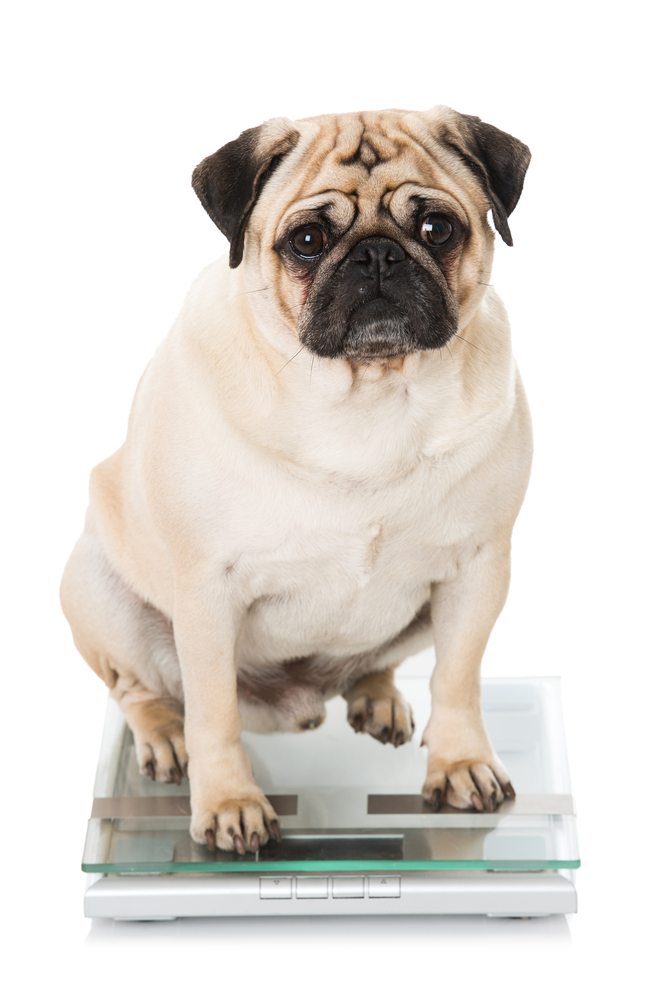 Weight loss can be a challenge for anyone (people or pets). However, helping your cat or dog lose weight can not only add years to their life, but can help give them an improved quality of life during those years. According to veterinary surveys, over half our nation’s dogs and cats are overweight. Being overweight increases the risk of arthritis, diabetes, heart disease, kidney disease, and some cancers. Here are 7 tips to help your pet lose weight: 1. Feed A Higher Protein Diet Not Enough Protein? When a pet is constantly begging, it could be that they are not getting enough protein. Think about it...when you eat too many carbohydrates - what happens?...you crave more carbs. While dogs and cats are natural scavengers, some pets seem to be ravenous. Check the ingredients on your pet's food label. There may be too many carbohydrates in the form of grains, potatoes or legumes (e.g. chickpeas, peas, etc). Carbohydrates are heavily used EVEN IN GRAIN-FREE DIETS to keep manufacturing costs down. If your pet does not have a medical need for a reduced protein diet (e.g. kidney or liver disease), switching to a higher protein, raw, freeze-dried raw or canned diet can help. Feeding a high protein diet can reduce insulin spikes. Because protein and fats digest more slowly, pets feel full for a much longer period of time. 2. Avoid High Fat Treats Small amounts of high fat treats can pile on the weight. For example, a tablespoon of peanut butter or coconut oil can be nearly as many calories as a 1/4 of a 13 oz can or 1/4 cup of dry pet food - it is highly caloric. If you use peanut butter to administer pills, try putting the pills in a small amount of canned food or pumpkin instead. 3. Do Not Free Feed Leaving dry food out all the time can lead to overeating. This is especially true in multi-pet homes. Free feeding usually results in some pets overeating while others under eat.
4. Add Vegetables To Your Pet's Diet
Vegetables, especially green vegetables, can help your pet feel more satisfied and offer a low calorie, nutritious source of bulk food. Vegetables contain fiber. Fiber naturally slows down the digestion of sugars, so adding fiber in the form of green vegetables will help regulate your pet's blood sugar and help them feel full. You can also use a small amount of pumpkin as well. Good vegetable choices for dogs: green beans, squash and a small amount of carrots. Many cats like pureed asparagus if it is mixed into their food. You can replace some of your pet's food with vegetables or simply add them to meals to slow down the eating process, giving your pet a more satisfying eating experience. 5. Plan Time To Exercise When it gets cold outside and the days get shorter, it gets harder for us to go on walks. In the summer when it heats up, we have to plan around the hottest times of the day. While the weather always changes, your pet's exercise needs do not. Try to plan out a convenient time for you and your cat or dog to exercise together. Taking a walk (even a short walk is better than no walk), playing with a feather or laser toy or throwing a ball will all help. Even 15 minutes of daily exercise can reduce your pet's mortality rate. Exercise time is time well spent.
6. Measure Portions Carefully
Measure food carefully. “Guesstimating” how much pet food you are giving can lead to obesity. Many pet food scoops are actually two cups, not one. If you feed dry food, measure the amount in the scoop to see if it is one cup or two. A slight increase in food by topping off the scoop, or decrease by going slightly under, can surprisingly result in significant changes in weight. 7. Feed More Frequent Smaller Meals Feeding a few smaller meals can regulate your pet's blood sugar and improve digestion. That can be hard if you work full time. But pets do work up a bigger appetite if they don't eat all day, so if your schedule permits, feeding a lunch meal (by dividing your pet's daily intake over 3 meals) can help your pet lose weight. When pets are ravenous from not eating all day, they will gobble their meal up quickly leading to an insulin spike and more begging. |